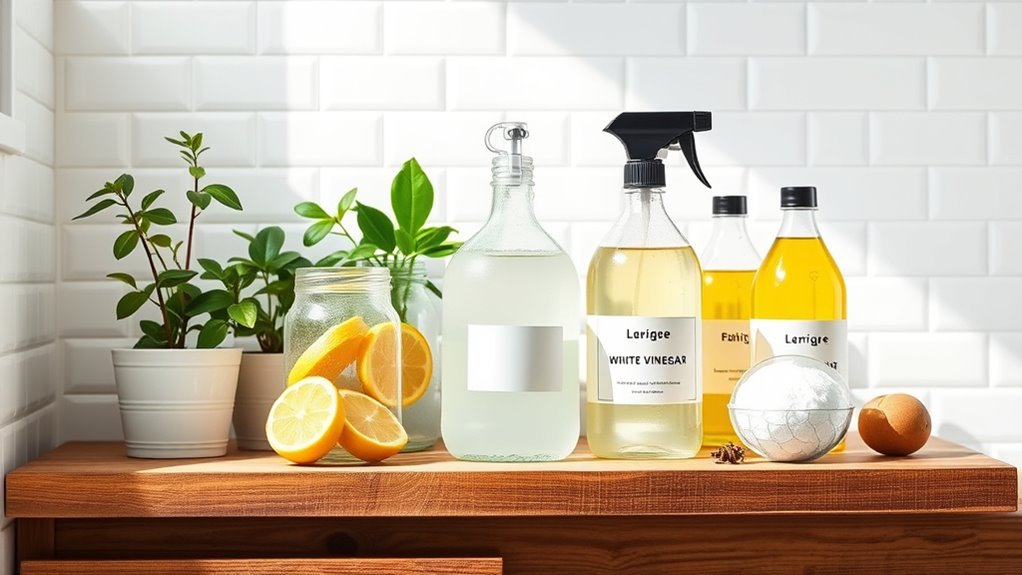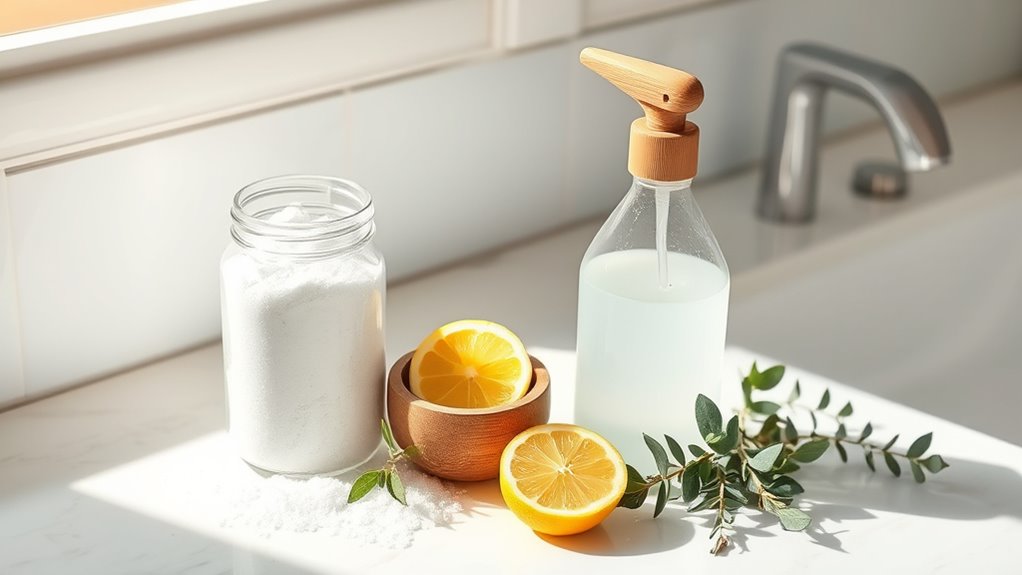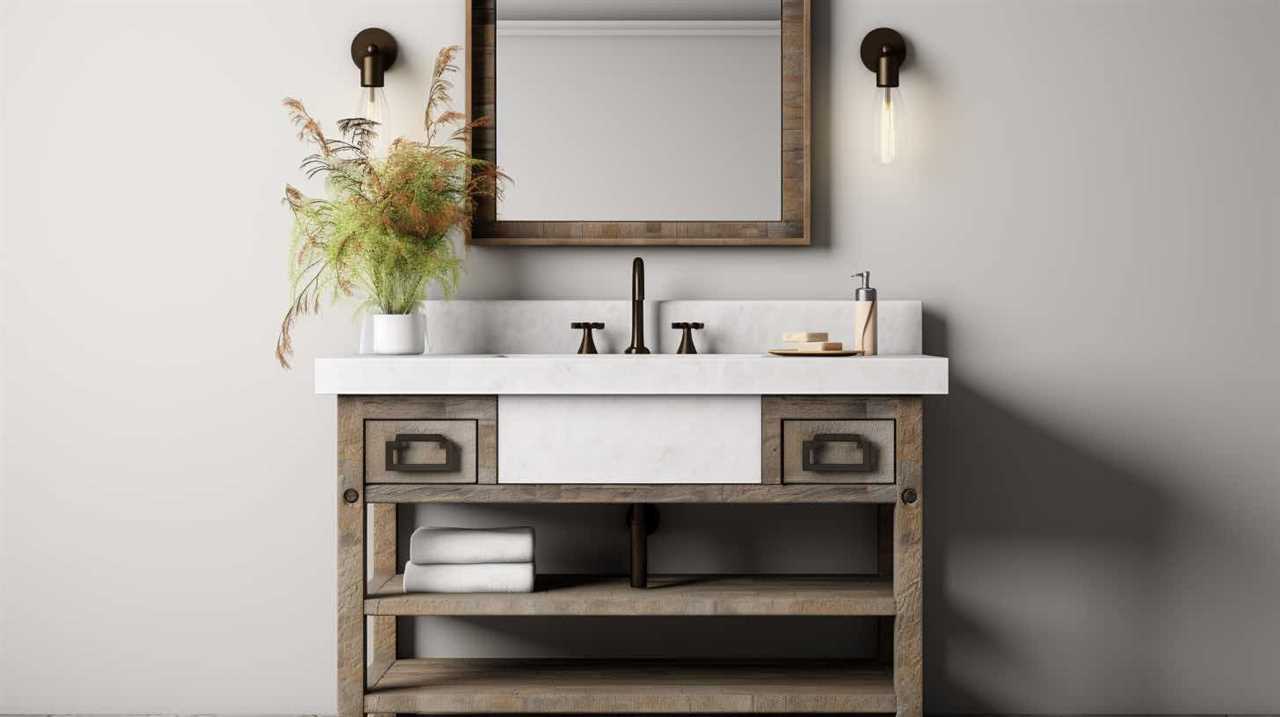Switching to homemade, eco-friendly bathroom cleaners is a smart way to save money and protect your family from harsh chemicals. You can use simple ingredients like white vinegar, baking soda, and lemon juice to create effective solutions for soap scum, mold, and mineral deposits. These natural cleaners are safe, environmentally friendly, and customizable with your favorite scents. Keep exploring to discover more tips and tricks for creating a spotless, healthy bathroom with homemade products.
Key Takeaways
- Discover simple, cost-effective DIY cleaners using common ingredients like vinegar, baking soda, and lemon for a natural bathroom refresh.
- Learn how to create effective disinfectants and deodorizers without harsh chemicals, ensuring a safe environment for family and pets.
- Understand the benefits of customizing your eco-friendly cleaners with essential oils and natural scents for a personalized touch.
- Find step-by-step instructions for preparing vinegar-based, baking soda, and lemon juice solutions to tackle soap scum, mold, and stains.
- Explore the environmental and health advantages of switching to homemade bathroom cleaners that minimize ecological impact.

Are you looking for ways to keep your bathroom spotless without harming the environment? You’re in the right place. Making your own eco-friendly bathroom cleaners is easier than you think, and it’s a great way to reduce your exposure to harsh chemicals. DIY cleaning solutions allow you to control what goes into your products, ensuring they’re safe, effective, and gentle on the planet. Plus, they’re usually inexpensive and simple to prepare with everyday ingredients you probably already have at home.
One of the most versatile and popular chemical free alternatives is a vinegar-based cleaner. White vinegar is a natural disinfectant and deodorizer, making it perfect for tackling soap scum, mold, and grime. To create a powerful bathroom cleaner, mix equal parts of white vinegar and water in a spray bottle. For added freshness, include a few drops of essential oils like tea tree or eucalyptus, which also have antimicrobial properties. Spray this solution on tiles, glass, and fixtures, then wipe with a clean cloth or sponge. Vinegar’s acidity helps break down mineral deposits and soap residues without relying on synthetic chemicals, making it a safe choice for your family and the environment.
Vinegar-based cleaners are versatile, natural, and effective for a sparkling, chemical-free bathroom.
Baking soda is another essential ingredient in your DIY cleaning arsenal. Its mild abrasive qualities make it excellent for scrubbing sinks, tubs, and toilets. To use baking soda effectively, sprinkle it directly onto surfaces or make a paste by mixing it with a small amount of water. For stubborn stains or buildup, let the paste sit for a few minutes before scrubbing gently with a brush or sponge. Combining baking soda with your vinegar spray can boost cleaning power—pour the vinegar solution into the toilet bowl or onto surfaces first, then sprinkle baking soda on top. The fizzing action helps lift grime and grime, giving you a thorough clean without any synthetic cleaners.
Lemon juice is another natural powerhouse you can incorporate. It acts as a natural bleach, deodorizer, and disinfectant. Squeeze fresh lemon juice into your homemade cleaner or use lemon slices in your spray bottles. Not only does it leave your bathroom smelling fresh, but its citric acid helps break down soap scum and hard water stains. Plus, lemon’s fresh scent is a natural alternative to Chemical air fresheners, which often contain synthetic fragrances. Incorporating a versatile cleaning ingredient like lemon not only enhances cleaning but also adds a pleasant aroma to your space.
Frequently Asked Questions
Are Homemade Bathroom Cleaners as Effective as Commercial Products?
Homemade bathroom cleaners can be just as effective as commercial products when you understand chemical reactions and ingredient sourcing. By choosing natural ingredients like vinegar or baking soda, you activate powerful reactions that break down grime and disinfect surfaces. Proper sourcing guarantees quality, so your cleaner works efficiently. With the right recipes, you’ll find homemade solutions not only eco-friendly but also capable of tackling bathroom messes just as well as store-bought options.
How Long Do Homemade Eco-Friendly Cleaners Typically Last?
Your homemade eco-friendly cleaners can last for months if you store them properly. Typically, their shelf life ranges from two weeks to several months, depending on ingredients. To keep them fresh, store your cleaners in airtight containers away from direct sunlight and heat. Good storage tips include labeling your bottles clearly and shaking them gently before use. With proper care, your natural cleaners stay effective and safe for a long time.
Can These Cleaners Be Used on All Bathroom Surfaces?
You can generally use homemade eco-friendly cleaners on most bathroom surfaces, but always verify for surface compatibility and material safety first. Some ingredients may be too harsh for delicate materials like natural stone or certain plastics. Test a small, hidden area before full application. This approach helps prevent damage and ensures your cleaner works effectively without harming your surfaces, keeping your bathroom both clean and safe.
Are Homemade Cleaners Safe for Children and Pets?
Think of homemade cleaners like gentle rain—safe but effective. When considering child safety and pet safety, use natural ingredients like vinegar and baking soda, which are usually safe when used correctly. However, avoid harsh essential oils or chemicals that could harm little ones or pets. Always store cleaners out of reach, and test small areas first. With proper precautions, your homemade solutions can be both safe and eco-friendly.
What Are Common Mistakes to Avoid When Making Eco-Friendly Cleaners?
When making eco-friendly cleaners, avoid common mistakes like improper ingredient substitutions, which can reduce effectiveness or cause reactions. Always follow recipes closely and use the correct ingredients. Also, pay attention to storage tips—store cleaners in labeled, airtight containers away from children and pets. Don’t rush the process or skip testing small batches. Being attentive helps guarantee your homemade cleaners are safe, effective, and eco-friendly.
Conclusion
By making your own eco-friendly bathroom cleaners, you’re reducing harmful chemical exposure and helping the environment. Did you know that conventional cleaning products contribute to nearly 25% of indoor air pollution? Switching to natural, homemade solutions not only safeguards your health but also cuts down on plastic waste and chemical runoff. So, give these simple recipes a try—you’ll keep your bathroom sparkling while making a positive impact on the planet. Every small change counts!










